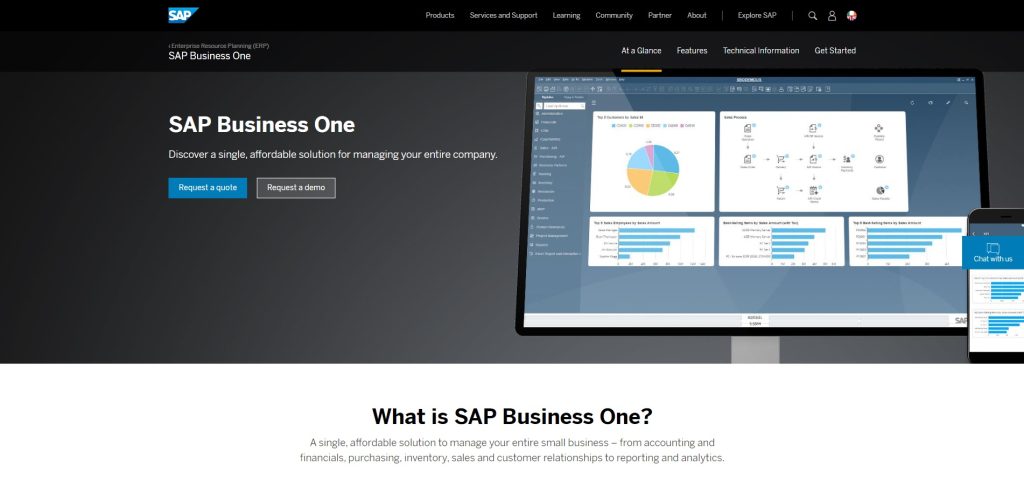SAP Business One is an integrated Enterprise Resource Planning (ERP) software solution designed specifically for small and midsize businesses. The software has been developed by SAP, the world’s leading software company specializing in enterprise solutions. SAP Business One provides businesses with an integrated suite of tools to manage financials, logistics, customer relationships, inventory, and production.

What Is SAP Business One?
SAP Business One provides a single platform for managing business processes and data, streamlining operations, and gaining real-time insights into business performance. It can help businesses automate and optimize their processes, improve visibility and control over operations, and make better decisions based on accurate and up-to-date information.
SAP Business One is highly customizable and can be tailored to meet the specific needs of different industries and business types. It can also integrate with other SAP and third-party applications, providing businesses with a comprehensive and flexible solution for managing their operations.
How Does SAP Business One Work?
SAP Business One works by integrating various business functions and data onto a single platform, allowing businesses to manage and streamline their operations. Here’s how it works:
- Modules: SAP Business One includes various modules for different business functions such as finance, sales, purchasing, inventory management, and production.
- Data integration: The system integrates data from different departments and functions, eliminating data silos and ensuring accuracy and consistency.
- Customization: SAP Business One is highly customizable and can be tailored to meet the specific needs of different businesses and industries.
- Automation: The system automates various tasks such as invoicing, inventory tracking, and order processing, reducing manual work and increasing efficiency.
- Reporting and analytics: SAP Business One includes reporting and analytics tools that provide real-time insights into business performance, allowing businesses to make data-driven decisions.
- Integration: SAP Business One can integrate with other SAP and third-party applications, allowing businesses to extend their functionality and streamline their operations.
Overall, SAP Business One is designed to simplify business processes and provide businesses with a single platform for managing their operations, improving efficiency, and gaining insights into their performance.
What Are The Key Features of SAP Business One?
SAP Business One offers a range of features to help businesses manage their operations efficiently. Some of the key features include:
- Financial management: SAP Business One provides a range of financial management features such as accounting, budgeting, banking, and cash flow management.
- Sales and customer management: The software allows businesses to manage their sales and customer interactions, including customer relationship management (CRM), sales forecasting, and sales order processing.
- Purchasing and procurement: SAP Business One includes features for managing purchasing and procurement, such as vendor management, purchase order processing, and inventory management.
- Inventory and distribution: The software provides features for managing inventory, including inventory tracking, stock management, and order fulfillment.
- Production management: SAP Business One includes features for managing production processes, such as production planning, bill of materials (BOM) management, and shop floor control.
- Reporting and analytics: The software includes built-in reporting and analytics tools that provide businesses with real-time insights into their performance.
- Customization: SAP Business One is highly customizable, allowing businesses to tailor the software to their specific needs and workflows.
- Mobile access: The software provides mobile access, allowing users to access and manage data on-the-go.
Overall, SAP Business One offers a comprehensive set of features designed to help businesses manage their operations efficiently, improve productivity, and gain insights into their performance.
Why Business Use SAP Business One?
Businesses use SAP Business One for several reasons, including:
- Centralized Management: SAP Business One provides a single platform for managing different business functions, data, and processes, helping businesses to streamline their operations and reduce manual work.
- Improved Efficiency: The software automates various tasks such as invoicing, inventory tracking, and order processing, reducing manual work and increasing efficiency.
- Real-time Insights: SAP Business One provides real-time data analytics and reporting tools, allowing businesses to make data-driven decisions and improve their overall performance.
- Customization: The software is highly customizable and can be tailored to meet the specific needs of different industries and business types.
- Scalability: SAP Business One is scalable, allowing businesses to start with a basic package and add more features as their needs grow.
- Integration: The software can integrate with other SAP and third-party applications, providing businesses with a comprehensive and flexible solution for managing their operations.
- Cost-effective: SAP Business One is cost-effective compared to other enterprise resource planning (ERP) software solutions, making it an affordable option for small and medium-sized businesses.
Overall, businesses use SAP Business One because it helps them to improve their efficiency, gain real-time insights into their operations, and streamline their processes in a cost-effective manner.
What Are the Different Versions of SAP Business One?
There are currently three versions of SAP Business One available:
- SAP Business One Professional: This is the standard version of SAP Business One and includes all of the core functionality, such as financial management, sales, purchasing, inventory management, and production.
- SAP Business One HANA: This version of SAP Business One is built on the SAP HANA in-memory database platform, which provides real-time data processing and analytics capabilities. It offers the same functionality as SAP Business One Professional, but with faster data processing and advanced analytics capabilities.
- SAP Business One Cloud: This version of SAP Business One is hosted in the cloud and offers the same functionality as SAP Business One Professional. It allows businesses to access their data from anywhere and provides automatic software updates and maintenance.
All versions of SAP Business One offer a range of features designed to help businesses manage their operations efficiently, improve productivity, and gain insights into their performance. Businesses can choose the version that best suits their needs and budget.
How To Uses SAP Business One?
To use SAP Business One, businesses typically follow these steps:
- Planning: The first step is to plan the implementation of SAP Business One by defining the project scope, identifying the key stakeholders, and setting goals for the project.
- Configuration: The next step is to configure SAP Business One to match the business processes and requirements. This involves setting up the software, defining user roles and permissions, and customizing the system to meet the business needs.
- Data migration: Businesses then need to migrate their existing data to SAP Business One. This involves importing data from spreadsheets or other systems, cleaning up the data, and mapping it to the relevant fields in SAP Business One.
- User training: Once the system is set up and the data is migrated, businesses need to train their users on how to use SAP Business One. This includes training on the software features, workflows, and best practices.
- Go-live: The final step is to go-live with SAP Business One. This involves deploying the system to the users and ensuring that everything is running smoothly. Businesses need to monitor the system, identify any issues, and make adjustments as necessary.
Once SAP Business One is up and running, businesses can use the software to manage their operations, including financial management, sales and customer management, purchasing and procurement, inventory and distribution, reporting and analytics, and more. They can also customize the system further, integrate it with other applications, and scale up as their needs grow.
How SAP Business One Can Benefit Your Business?
SAP Business One can benefit your business in several ways, including:
- Streamlining Operations: SAP Business One provides a single platform for managing different business functions, data, and processes. This can help streamline your operations, reduce manual work, and improve overall efficiency.
- Improved Decision-Making: SAP Business One provides real-time data analytics and reporting tools, allowing you to make data-driven decisions and gain insights into your business performance.
- Customization: SAP Business One is highly customizable and can be tailored to meet the specific needs of your industry and business type.
- Scalability: SAP Business One is scalable, allowing you to start with a basic package and add more features as your needs grow.
- Integration: SAP Business One can integrate with other SAP and third-party applications, providing you with a comprehensive and flexible solution for managing your operations.
- Improved Customer Relationships: SAP Business One includes features for managing customer interactions, such as customer relationship management (CRM), sales forecasting, and sales order processing. This can help improve customer satisfaction and build stronger relationships with your customers.
- Cost-effective: SAP Business One is cost-effective compared to other enterprise resource planning (ERP) software solutions, making it an affordable option for small and medium-sized businesses.
Overall, SAP Business One can help you improve your operations, gain insights into your business performance, and build stronger relationships with your customers, all while remaining cost-effective and scalable.
Pros & Cons of SAP Business One :
There are Some Pros & Cons of SAP Business One.
Pros of SAP Business One:
- Comprehensive: SAP Business One is a comprehensive software solution that provides businesses with a range of features for managing their operations, including financial management, sales and customer management, purchasing and procurement, inventory and distribution, and reporting and analytics.
- Customizable: The software is highly customizable and can be tailored to meet the specific needs of different industries and business types.
- Scalable: SAP Business One is scalable, allowing businesses to start with a basic package and add more features as their needs grow.
- Real-time Insights: SAP Business One provides real-time data analytics and reporting tools, allowing businesses to make data-driven decisions and improve their overall performance.
- Integration: The software can integrate with other SAP and third-party applications, providing businesses with a comprehensive and flexible solution for managing their operations.
- Easy-to-use: SAP Business One is user-friendly, making it easy for businesses to learn and use the software.
Cons of SAP Business One:
- Cost: SAP Business One can be expensive for some businesses, especially smaller ones. The cost of implementation and ongoing maintenance can be a significant investment for some organizations.
- Complex: Although SAP Business One is user-friendly, it can be complex and require a high level of technical expertise to implement and customize the software.
- Limited Industry-Specific Features: SAP Business One offers industry-specific features, but they may be limited compared to other industry-specific software solutions.
- Implementation Time: Implementing SAP Business One can be time-consuming, requiring businesses to invest significant resources in the process.
- Cloud-based limitations: The cloud version of SAP Business One may have some limitations compared to the on-premise version, such as fewer customization options and slower data processing in some cases.
Overall, while SAP Business One offers many benefits for businesses, it may not be the best fit for every organization due to the costs, complexity, and limitations. It’s important to carefully evaluate your business needs and resources before deciding whether SAP Business One is the right software solution for you.
Conclusion
In conclusion, SAP Business One is a comprehensive and customizable software solution designed to help businesses manage their operations more efficiently. It offers a range of features for managing financials, sales, purchasing, inventory, distribution, and reporting, as well as real-time data analytics and reporting tools for making data-driven decisions.
Read Also : What Is QuickBooks & How To Uses?
While SAP Business One has its pros and cons, it can benefit businesses of all sizes by streamlining their operations, improving decision-making, and providing insights into their performance. It is also scalable, which allows businesses to start with a basic package and add more features as their needs grow.
Overall, SAP Business One is a robust software solution that can help businesses gain a competitive edge by improving their operations and customer relationships. However, it’s important for businesses to carefully evaluate their needs and resources before deciding whether SAP Business One is the right software solution for them.
